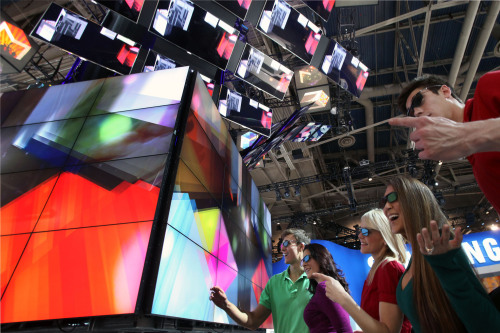TV makers draw swords on Google, Apple in war over living rooms
By 황장진Published : Jan. 5, 2011 - 18:55
Television makers will use the Consumer Electronics Show in Las Vegas to introduce new Internet services and blunt efforts by Google Inc. and Apple Inc. to dominate home entertainment.
Samsung Electronics Co., LG Electronics Inc. and Cisco Systems Inc., the set-top box supplier, will unveil applications, signaling they won’t cede leadership to Google, Apple or other upstarts angling to get consumers to view Internet programming via TV.
“All these companies are starting to break out on their own because you can move quicker and at the same time be different by not being beholden to development partners,” said Richard Shim, senior analyst for DisplaySearch, a Santa Clara, California-based industry researcher.
More than half of TVs sold in 2014 will offer Web service, DisplaySearch said. Electronics makers consider television sets, which carry higher price tags than other devices and are the focal point of many consumers’ living rooms, a key to boosting margins and fostering brand loyalty. Controlling the first screen TV viewers see is part of that effort.
Samsung Electronics Co., LG Electronics Inc. and Cisco Systems Inc., the set-top box supplier, will unveil applications, signaling they won’t cede leadership to Google, Apple or other upstarts angling to get consumers to view Internet programming via TV.
“All these companies are starting to break out on their own because you can move quicker and at the same time be different by not being beholden to development partners,” said Richard Shim, senior analyst for DisplaySearch, a Santa Clara, California-based industry researcher.
More than half of TVs sold in 2014 will offer Web service, DisplaySearch said. Electronics makers consider television sets, which carry higher price tags than other devices and are the focal point of many consumers’ living rooms, a key to boosting margins and fostering brand loyalty. Controlling the first screen TV viewers see is part of that effort.

Samsung, based in Suwon, Korea, began courting software developers last year to create applications for an online store called Samsung Apps that is available on its TVs, Blu-ray players, computers, Galaxy Tab smartphones and tablets.
LG Electronics, based in Seoul, Tokyo-based Toshiba Corp. and other manufacturers are expected to follow with announcements of similar application stores at the show. Vizio Inc., the TV maker based in Irvine, California, will display a tablet computer and smartphone linked to its applications store.
“As more and more people are adopting connected TVs, we believe they are looking for new capabilities,” Tim Alessi, LG’s director of product development, said in an interview.
Apple, the Cupertino, California-based maker of the iPad and iPhone, has sold millions of the devices by offering consumers hundreds of thousands of applications through an online store that lets them personalize their products.
Google, based in Mountain View, California, is trying to lure product developers to its Google TV platform for Web- enabled devices.
In May, the owner of the most popular search engine introduced a custom operating system for Internet TV that works with the Google Chrome browser. Google TV improves the audience’s experience by integrating Web services such as Netflix Inc., making channel listings easier to search and letting viewers see the recommendations of others.
While Google signed Sony Corp. and Logitech International SA as initial product partners, the company was blocked from offering shows available at CBS Corp.’s TV.com, the major networks’ own Web pages and Hulu.com, the site owned by General Electric Co.’s NBC, News Corp. and ABC parent Walt Disney Co.
“There’s overwhelming evidence that consumers want a la carte and on-demand streaming of every kind of content,” said Ryan McIntyre, managing director of venture capital firm Foundry Group in Boulder, Colorado, and former director at Sling Media, now part of EchoStar Corp. “But there’s still a long way to go before you can sit down in front of your TV or computer and have access to the entire universe of content in one place.”
Cisco, the largest maker of computer-networking equipment, aims to overcome that hurdle.
As Comcast Corp.’s Xfinity, Hulu LLC and Netflix blur the lines between pay television, online shows and on-demand content, Cisco is trying to capitalize by offering service providers the ability to deliver video to any type of Internet- connected device.
San Jose, California-based Cisco will announce plans to help service providers deliver on that promise.
TV manufacturers are considering their own Web browsers, though most consumers probably won’t use them, Alessi said.
“We’re not so sure people really want to turn their TV into a computer like the full-blown Google TV thing,” Alessi said.
The race to create products comes as both wireless and wireline broadband services are upgrading to let consumers obtain content faster.
About 64 percent of U.S. households have fast Internet service, the National Telecommunications and Information Administration, a part of the Commerce Department, reported in a study last year.
In addition, Verizon Wireless, Sprint Corp. and other U.S. carriers are expanding their fourth-generation networks, which are expected to be 10 times faster than current services. They’re all demonstrating new smartphones in Las Vegas.
The networks, which use technologies called LTE and WiMAX, are fast enough to let consumers view high-definition videos. They may let consumers replace conventional pay TV and get their entertainment from the airwaves again. (Bloomberg)








![[Graphic News] More Koreans say they plan long-distance trips this year](http://res.heraldm.com/phpwas/restmb_idxmake.php?idx=644&simg=/content/image/2024/04/17/20240417050828_0.gif&u=)
![[KH Explains] Hyundai's full hybrid edge to pay off amid slow transition to pure EVs](http://res.heraldm.com/phpwas/restmb_idxmake.php?idx=644&simg=/content/image/2024/04/18/20240418050645_0.jpg&u=20240419100350)





![[From the Scene] Monks, Buddhists hail return of remains of Buddhas](http://res.heraldm.com/phpwas/restmb_idxmake.php?idx=652&simg=/content/image/2024/04/19/20240419050617_0.jpg&u=20240419175937)

![[KH Explains] Hyundai's full hybrid edge to pay off amid slow transition to pure EVs](http://res.heraldm.com/phpwas/restmb_idxmake.php?idx=652&simg=/content/image/2024/04/18/20240418050645_0.jpg&u=20240419100350)

![[Today’s K-pop] Illit drops debut single remix](http://res.heraldm.com/phpwas/restmb_idxmake.php?idx=642&simg=/content/image/2024/04/19/20240419050612_0.jpg&u=)